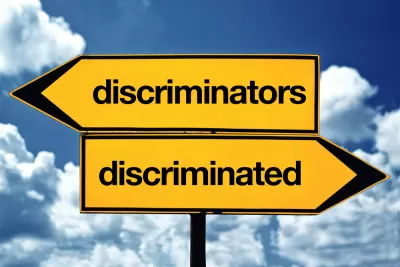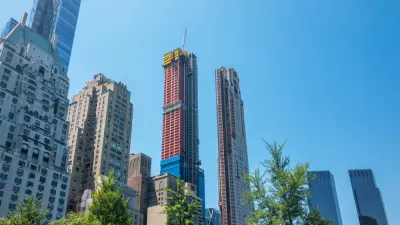Extell Development Company made news last summer by proposing a luxury development with a separate entrance for below-market-rate units. Now that the project is fully approved, New York councilmembers might expand anti-discrimination policies.

Bryce Covert reports, "Extell, which is building the 33-story complex, will build a specific door for the 55 affordable housing units it’s including in order to be allowed to build a bigger building. The low-income units, which are available to people making 60 percent of median income or less, will also be in a segment that only contains affordable apartments and that faces the street while the luxury apartments will face the river."
The problem is becoming more common as developers look to gain more square footage under the city's inclusionary housing allowances. According to Covert, "besides being made to use a separate entrance, some low-income residents in luxury buildings are prohibited from using the amenities offered to the wealthy tenants, which in the case of this particular building include swimming pools and regulation-sized basketball courts. Several buildings in the city ban affordable housing or rent-regulated tenants from using perks like gyms, rooftops, and pools, and the practice is on the rise."
The Department of Housing Preservation and Development approved the project, as first reported by Kate Briquelet for the New York Post. According to Covert, however, "New York City lawmakers have taken notice of all of this, and two council members are working on legislation that would expand the city’s anti-discrimination protections to include rent-regulated tenants. A state assemblywoman has introduced legislation that would require buildings to let low-income renters use all the amenities."
FULL STORY: Luxury Apartment Building Will Have Separate Door For Poor Residents

Alabama: Trump Terminates Settlements for Black Communities Harmed By Raw Sewage
Trump deemed the landmark civil rights agreement “illegal DEI and environmental justice policy.”

Study: Maui’s Plan to Convert Vacation Rentals to Long-Term Housing Could Cause Nearly $1 Billion Economic Loss
The plan would reduce visitor accommodation by 25% resulting in 1,900 jobs lost.

Planetizen Federal Action Tracker
A weekly monitor of how Trump’s orders and actions are impacting planners and planning in America.

Waymo Gets Permission to Map SF’s Market Street
If allowed to operate on the traffic-restricted street, Waymo’s autonomous taxis would have a leg up over ride-hailing competitors — and counter the city’s efforts to grow bike and pedestrian on the thoroughfare.

Parklet Symposium Highlights the Success of Shared Spaces
Parklets got a boost during the Covid-19 pandemic, when the concept was translated to outdoor dining programs that offered restaurants a lifeline during the shutdown.

Federal Homelessness Agency Places Entire Staff on Leave
The U.S. Interagency Council on Homelessness is the only federal agency dedicated to preventing and ending homelessness.
Urban Design for Planners 1: Software Tools
This six-course series explores essential urban design concepts using open source software and equips planners with the tools they need to participate fully in the urban design process.
Planning for Universal Design
Learn the tools for implementing Universal Design in planning regulations.
Caltrans
Smith Gee Studio
Institute for Housing and Urban Development Studies (IHS)
City of Grandview
Harvard GSD Executive Education
Toledo-Lucas County Plan Commissions
Salt Lake City
NYU Wagner Graduate School of Public Service




























